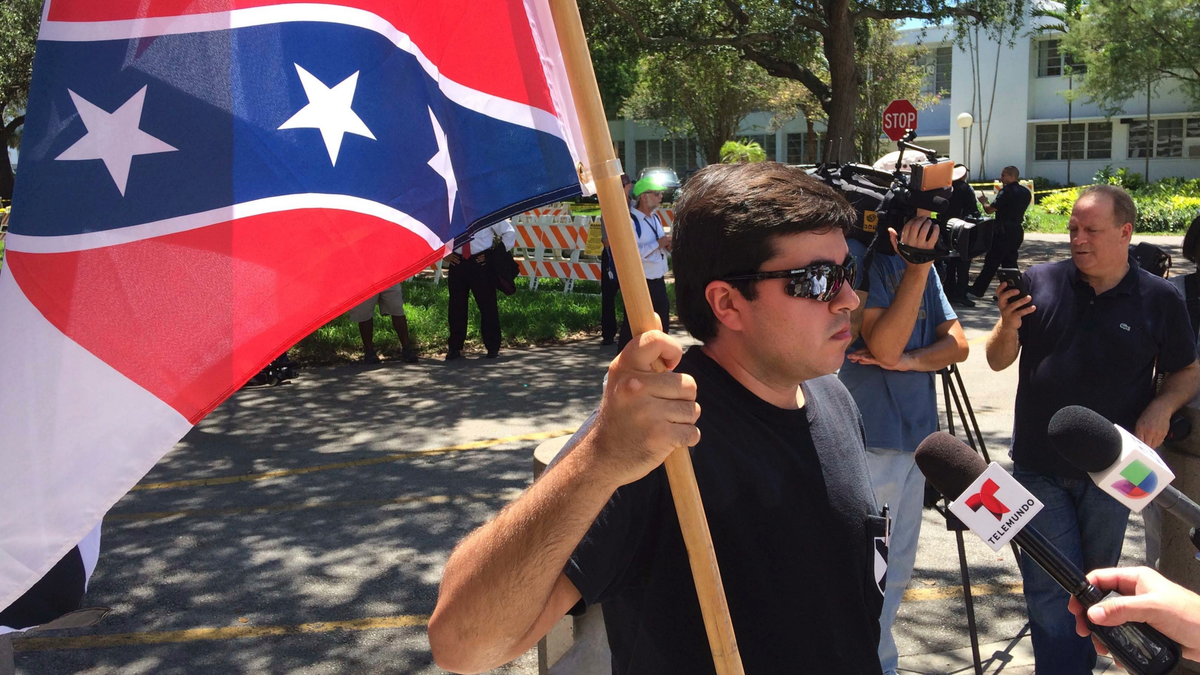
HOLLYWOOD, Fla. – In a story Aug. 30 about the Hollywood, Florida, city commission voting to remove the names of Confederate generals from city streets, The Associated Press identified a protester as "Chris Tedino of Miami," the name and hometown he gave reporters during pre-arrest interviews. Police records show his real name is Christopher Monzon and that he is from Hialeah.
A corrected version of the story is below:
Florida city votes to strip Confederate names from streets
The city commission of a suburb in Florida has voted to erase the names of Robert E. Lee and two other Confederate generals from the city's streets
By TERRY SPENCER
Associated Press
HOLLYWOOD, Fla. (AP) — A Florida city commission voted Wednesday to strip the names of Robert E. Lee and two other Confederate generals from the suburb's streets, the latest in a recent spate of skirmishes over whether those who led the Southern army should still be honored 152 years after the Civil War ended.
The Hollywood City Commission voted 5 to 1 to remove the names of Lee, Nathan Bedford Forrest and John Bell Hood from residential streets that hopscotch through the Fort Lauderdale suburb. More than 200 supporters and opponents of the change packed the commission chamber and the adjoining lobby, with most of the approximately 100 speakers generally spirited but polite.
Mayor Josh Levy, who voted for the change, said he hoped it would bring the community together by showing a "spirit of companionship" that recognizes that many black residents were offended by these names.
"These streets are symbols of men whose deeds symbolized oppression and bigotry against a whole group of people," Levy said. Five of the commission's six white members voted for the change.
The one Hispanic, Peter Hernandez, walked out of the meeting before the vote in protest over procedure. Before he left, he said he opposed the change because he says the commission had not followed its rules and he thought there would be a push to change other street names. Hernandez, a Democrat, also said the change was "a Democratic national agenda that is being pushed upon us."
The commission will vote to rename the streets at a later meeting. The members indicated they will likely rename Forrest Street for Frankie Mae Shivers, a black, female city police officer who was shot to death in 1982.
The name changes were supported by the city's Chamber of Commerce and by more than half of the meeting's speakers.
Benjamin Israel, a black resident who was one of the early leaders to change the street names, said the idea that residents would be "inconvenienced" by the name changes was "ridiculous."
"Think of the inconvenience of the Civil War. Over 600,000 were killed. This will help make a better America," Israel said. "This is not a racial matter. Most of the people killed in the Civil War were white."
Opponents argued that stripping the names of Lee, Hood and Forrest will be erasing history.
John Jacobs of the group "Save Our Streets," which opposed the change, said the commission trampled on residents' rights when the members waived a city ordinance that says affected property owners need to be polled before a street name can be changed, knowing there would be little support. He said change supporters "waged a propaganda campaign by making outlandish and false accusations" against the generals. Lee, he said, didn't fight to support slavery but to uphold his home state of Virginia's right to secede.
"These were not treasonous men. They were 19th century men and shouldn't be judged by 21st century standards," he said.
Some opponents, meanwhile, suggested keeping the name of Lee Street by renaming it for Harper Lee, who wrote the classic Southern novel "To Kill a Mockingbird."
A few hours before the meeting, protests briefly turned tense when a lone pro-Confederate protester charged at about 100 anti-Confederate demonstrators. Hollywood police quickly tackled Christopher Monzon, 21, of Hialeah, throwing him and his Confederate flag to the ground before he was led away. The confrontation occurred outside Hollywood City Hall, hours before the commission meeting opened.
If the measure passes, Hollywood would join Gainesville, home of the University of Florida, and the Gulf coast town of Bradenton as Florida cities that have removed Confederate memorials. Those two cities removed statues. Tampa will remove a statue in the coming weeks.
Monzon had been standing alone, holding a flag that was half-Confederate battle flag and half a black X on a white field. He was yelling at the other group, calling them "traitors."
Several street names dating to the city's 1925 founding honor military officers both U.S. and Confederate. Others are named after U.S. Civil War Gen. George McLellan, Adm. David Farragut, who led the Union Navy during the Civil War, as well as World War I Gen. John J. Pershing.
The debate over Confederate street names, statues and other symbols is being conducted in several communities around the U.S. The memorials have been under increased scrutiny since deadly violence at a white nationalist rally in Charlottesville, Virginia, earlier this month.
In Kentucky, group of black lawmakers, pastors and advocacy groups called anew this week for the removal of a Jefferson Davis statue in that state's Capitol. That landmark building is home to five statues of famous Kentuckians, including former President Abraham Lincoln and Davis, the only president of the Confederacy.









































